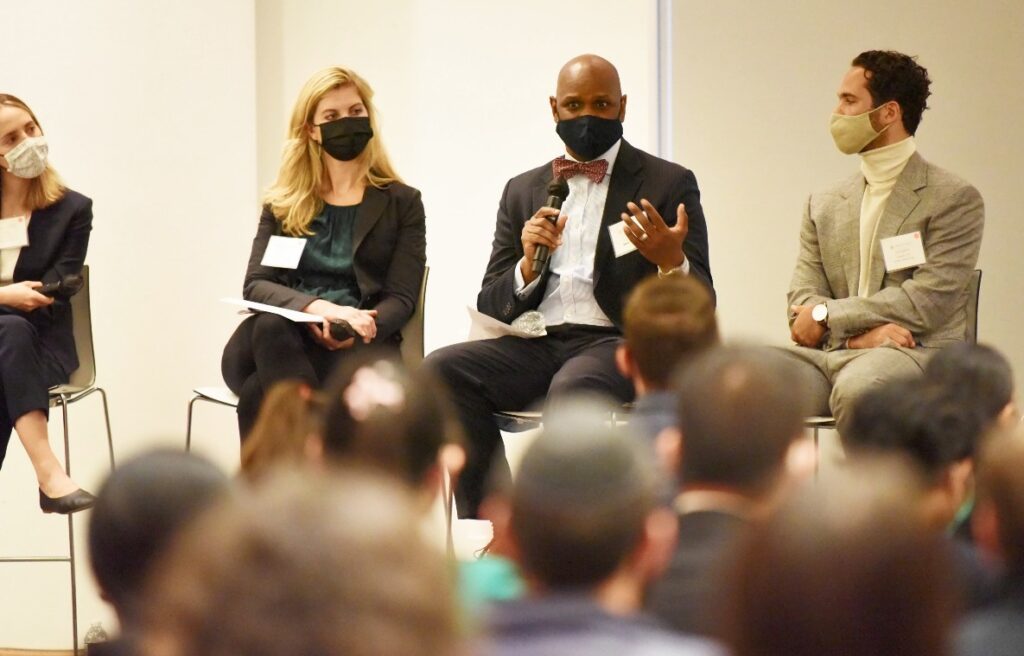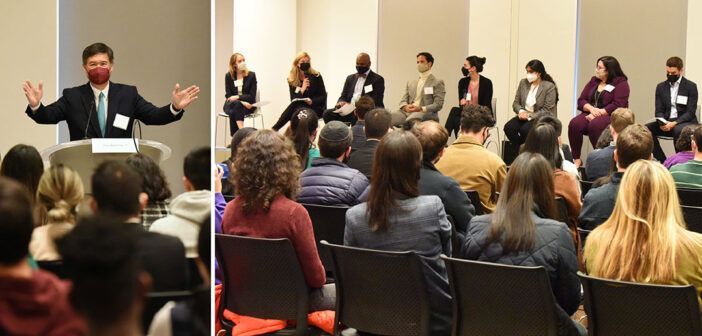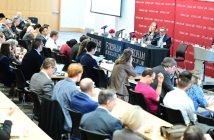On Wednesday, October 27, the Center for Judicial Events & Clerkships (CJEC) welcomed more than 100 students to its first in-person event since March 2020. The event titled “Judges and Clerks’ Roles in the Courts: Perspectives from First-Generation Alumni” is part of the Center’s first-generation initiative developed in partnership with the Fordham First Generation Students (F1GS).
The event featured remarks by Senior Judge Denny Chin ’78, U.S. Circuit Court of Appeals for the Second Circuit and Fordham Law’s inaugural Lawrence W. Pierce Distinguished Jurist in Residence, and welcomed 10 first-generation Fordham Law alumni who are or were clerks for a panel discussion.
“The Judicial Center is dedicated to building broad communities of support. Hosting events for first-generation students is critical to our mission of developing community that is visible, vibrant and welcoming,” said Suzanne M. Endrizzi ’96, assistant dean. “We are incredibly lucky to have Judge Chin and alumni who are passionate about supporting our students. Moreover, the CJEC benefits enormously from our student leadership—Peer Clerkship Council (PCC)—in developing events for our current students.”
Judge Chin’s Trajectory to the Bench
Judge Chin spoke about his experiences as an immigrant from Hong Kong, first-generation student and lawyer, judicial clerk, and now judge. He has presided over a number of notable federal court cases during his 27-year career on the bench—including matters involving Megan’s Law, the Million Youth March, the Google Books Project, the United Nations Oil-for-Food Programme, and the sentencing of financier Bernard Madoff while serving as a U.S. District Judge for the Southern District of New York (SDNY).
“Having a law degree is great,” Judge Chin said. “It gives you the tools and abilities to do many different things.”
Judge Chin recollected that interning for Hon. Henry F. Werker of the U.S. District Court for the SDNY, during his first summer as a law student, significantly impacted his career trajectory. He said he had an affinity for the experience of being in the courthouse, and he distinctly remembered watching a bank robbery trial proceed, thinking what a great job it would be to serve as an assistant U.S. attorney. It was at that time that Judge Chin decided he wanted to clerk, and he later became a judge in that courthouse. He believes that the courthouse where he now sits as a circuit judge was the same one where his grandfather was sworn in as a U.S. citizen in 1947.
Judge Chin, who served as a trial judge for 16 years and has worked at the appellate level for the past 11 years, shared with the attendees the role of judges on both courts as well as some of the key differences between the two positions.
“As a trial level judge there is a broad variety in the work and a fast pace—presiding over jury trials, making sure the jury understands the law, making sure things run on time, [and]sentencing people, which is the hardest thing that judges do,” Judge Chin said. “One of the fun things about being a federal judge is that you get everything—criminal, civil, commercial, civil rights, and intellectual property cases.”
“In the appellate court, it’s largely reading, some writing, and a fair amount of editing my law clerks’ work,” he continued.
Currently, Judge Chin has four clerks by his side helping him with day-to-day tasks like researching and writing bench memos and drafting opinions. But, as he noted, he has dozens of former clerks who he considers “family.” “One of the best things about being a judge is my law clerks—having a family of law clerks now over the course of 27 years,” Judge Chin said.

Senior Judge Denny Chin ’78, U.S. Circuit Court of Appeals for the Second Circuit, speaks to the Fordham Law community about his path to the bench.
First-Generation Alumni Clerks Shared Their Unique Experiences
At the conclusion of Judge Chin’s remarks the attending Fordham Law alumni clerks took the stage to participate in a panel discussion.
The participating current and former clerks represented a broad and diverse range of clerkship experiences across the state and federal levels. Moreover, the participating alumni each came to choose clerkships for differing reasons—be it to pursue a path in litigation in the private sector, government service, prosecutorial roles or impact litigation.
Angelo Guisado ’12, staff attorney at the Center for Constitutional Rights, spoke about his appellate clerkships with both Associate Justice Ariane Vuono at the Massachusetts Appeals Court during the 2012-13 term and the late Judge Damon Keith of the U.S. Court of Appeals for the Sixth Circuit during the 2013-14 term. He called the CJEC program a “resounding success.”
The first-generation students in attendance benefitted from hearing about each of these different perspectives. PCC members Alexandria Bell ’22 and Tatiana Hyman ’22 developed specific questions for each alum to address keyed to their particular clerkship, path, and/or experience.
“It was so great attending the event, not only because it was my first time back as an alumna, but [because]it was also an honor to hear Judge Chin share his experiences and for me to speak alongside with other first-generation alumni,” said Saniya Suri ’21 (a member of the inaugural 2020-2021 Peer Clerkship Council) who will be clerking for Judge Cathy Seibel of the SDNY during the 2022-23 term. “As a first-generation law student, I sought out as many opportunities as I could to figure out what I wanted to do as a lawyer and, time after time, it became clear that clerking would be an incredible opportunity.”
“Dean Endrizzi assembled a wonderfully diverse panel of alumni—including Judge Denny Chin—who offered students an array of insights and tips to succeed in the once-cryptic clerkship process,” Guisado said. “I hope it continues next year.”

(L-R) Amy Torres ’12, Amy Martella ’07, John Owens ’04, and Angelo Guisado ’18 shared their clerkship experiences.
A Welcome Return of In-Person Networking
The evening concluded with a reception wherein Fordham Law students and Increasing Diversity in Education and the Law (IDEAL) program participants casually spoke with Judge Chin and the alumni law clerks about law school and their career paths.
“It was really great to see that so many alums attended and networked with students during the reception,” Hyman said. “The great turnout from alumni shows that the Fordham Law network is very strong and that students have continued support from the Fordham alumni who so generously give of their time to mentor and guide students.”
Bell, who helped Dean Endrizzi and Hyman organize the event, said the program was especially meaningful to assist with and attend as both a law student and descendant of Cuban immigrants. “I hope all the students walked away from this event confident and encouraged to pursue the clerkship path or learn more about why clerking might be the right fit for them post-graduation,” she said.
Building Bridges to the Next Generation
As part of the CJEC’s first-generation initiative, the Center partners with Fordham Law’s Office of Student Affairs and Diversity to arrange for a special pre-meet with IDEAL Students and the participating jurist. The six IDEAL students who attended this pre-meet with Judge Chin had the opportunity to hear from him in a more intimate setting about his path and ask informal questions.
Looking Ahead
In February 2022, the Judicial Center looks forward to hosting Judge Diane Humetewa, U.S. District Court for the District of Arizona, the first Native American woman and enrolled tribal member (Hopi) to serve as a federal judge, as its 2022 First to the Bench speaker for a virtual discussion.





